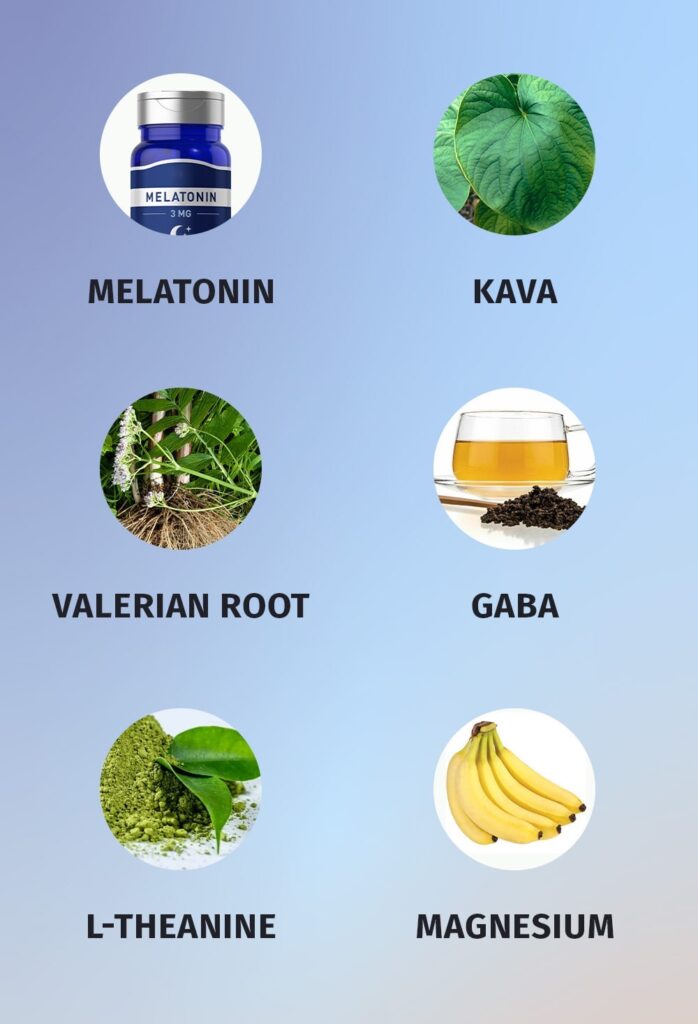You’ve heard of energy drinks, but there’s a new wave of anti-energy drinks that are hitting the shelves. Anti-energy drinks might sound odd at first, but they have one goal: to help you sleep.
We’ve spoken to experts and done the research about this new drink trend. Curious about these unique beverages? We’re here to inform you and help you decide if it’s time to try a new drink.
What are Anti-Energy Drinks and Relaxation Drinks?
We all know that there are things like “sleepy time tea” which can help you get ready for bed. But the anti-energy drink is rising in popularity. In the way that coffee and energy drinks give you a boost with caffeine, anti-energy, or relaxation, drinks are intended to do the opposite.
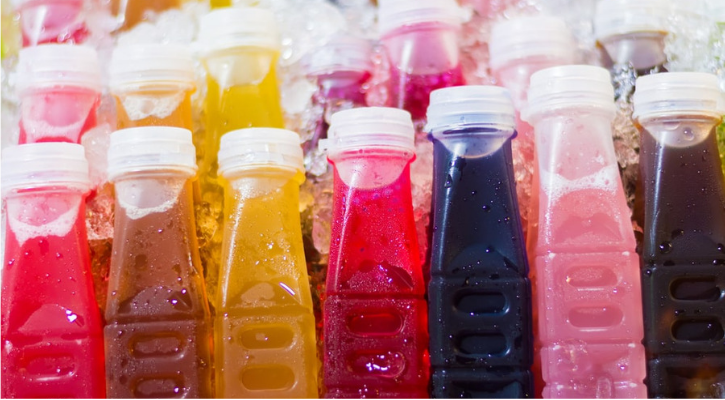
The ingredients used in anti-energy drinks are on the opposite end of the spectrum from caffeine. These ingredients range from natural, plant-based ingredients like valerian root and kava, to things our bodies can naturally produce like melatonin or magnesium.
Energy Drinks vs Anti-Energy Drinks
Besides the obvious category differences, how do energy and anti-energy drinks differ? Generally speaking, the ingredients, sugar levels, and side effects will be very different between these.
Anti-energy drinks utilize ingredients that are known to help either promote a relaxed state or help you fall asleep. Melatonin is one of the most common ingredients you’ll see. Think of melatonin as the polar opposite of caffeine; melatonin promotes sleep, while caffeine prevents sleep.
Energy drinks often contain taurine and ginseng, which are known to boost energy. And of course, you can’t forget about sugar! Though I should note: Sugar can still be present in anti-energy drinks, though energy drinks commonly have more.
| Category | Anti-Energy Drinks | Energy Drinks |
| Ingredients | Melatonin, valerian root, GABA | Taurine, Ginseng, Caffeine |
| Sugar levels | 0-5 grams per serving | 21-34 grams per serving |
| Side effects | Dizziness, nausea, fatigue | Dehydration, anxiety, heart complications |
Anti-Energy Drinks vs Alcohol
While alcohol can certainly make you sleepy, the quality of your sleep will not be as good as it will when you consume an anti-energy drink. Anti-energy drinks promote relaxation and sleep, while alcohol is a depressant on your nervous system. Check out our graphic below to see the differences between alcohol and anti-energy drinks.
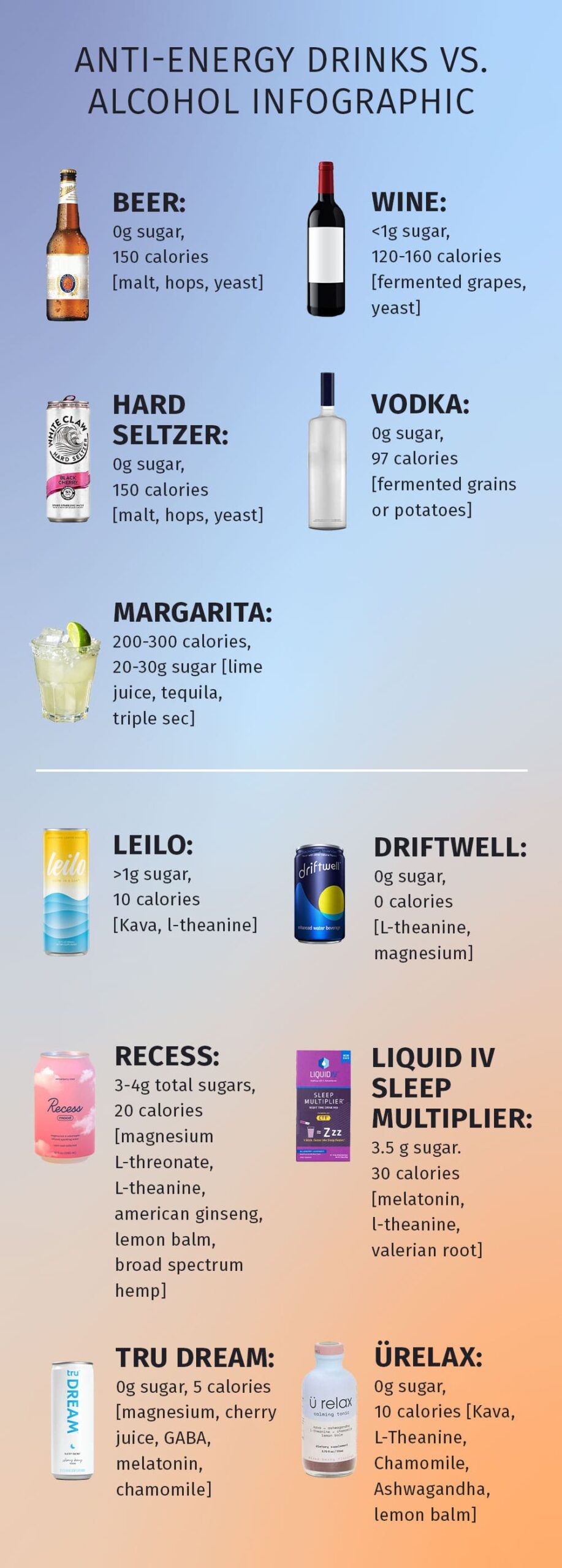
Alcohol can help you fall asleep sooner, but you’re more than likely going to wake up more frequently throughout the night and not achieve deep sleep. Anti-energy drinks can help you fall asleep and stay asleep.
RELATED: How Alcohol Impacts Sleep
Common Anti-Energy Drink Ingredients
Now that we know what anti-energy drinks are and how they differ from other drinks, let’s take a look at some of the most common ingredients and break them down one by one.
Melatonin
These days, one of the most common sleep aids that gets recommended is melatonin. Though you can take melatonin to help you fall asleep, it’s a hormone that your brain naturally produces on its own. It is the hormone that, quite literally, tells you to go to sleep!
Your body ramps up melatonin production when the sun goes down. But because of indoor lights and many of us using our phones right before bed, our brain might not produce enough melatonin to help us fall asleep when we’d like.
Melatonin comes in many different forms as a sleep aid, from gummies to pills. When it comes to melatonin usage, you should take it sparingly, as your body only needs a small amount. Many options on the market have dosages that are over the recommended amount. Taking too much melatonin is part of the reason why people wake up feeling groggy the next morning.
Kava
Kava (also called kava kava) is a plant from the Pacific Islands. Whether it’s dried, in a pill form, or used as an extract, kava is popular for its ability to make people feel relaxed. In some cases, depending on the amount of kava ingested, it can cause drowsiness, too.
However, too much kava can lead to nausea, loss of muscle control, and dilated pupils. According to the National Capital Poison Control, individuals with liver damage should avoid ingesting kava, as it can cause further damage to the liver.
Valerian Root
Valerian root is another common, plant-based sleep aid that has been used for quite some time. The Mayo Clinic reports that many studies have found that using valerian root can decrease the amount of time it takes to fall asleep and give the user better quality sleep. It has even been used medicinally to treat insomnia.
The Mayo Clinic notes that a recommended dosage amount is still uncertain, though it’s a generally safe supplement to take to help with sleep. Circumstances where you shouldn’t take valerian root include:
- If you’re pregnant or breastfeeding (it’s unclear if valerian root is safe for unborn babies or children under 3)
- Have liver disease
- Before you drive or operate heavy machinery
- You need a long-term solution for insomnia
GABA
GABA, which stands for “gamma-aminobutyric acid,” is a naturally occuring amino acid that your brain produces. It is an inhibitory neurotransmitter, meaning that instead of sending messages through your brain, it blocks them. This can help pump the breaks on your brain and the messages being sent, which is why it’s popular in the sleep aid space.
There are oral supplement versions, but Mental Health America also notes that green, oolong, and white tea are natural products that you can take to increase your GABA production.
L-Theanine
L-theanine is an amino acid that’s found in certain types of teas, typically green or black. This is not something that people can produce naturally, but when ingested, it can help people relax and fall asleep. The safest way to ingest L-theanine is by drinking tea, though tablet and capsule versions of L-theanine exist.
Magnesium
Magnesium is something our bodies need to function. You can get the needed amount of magnesium from your diet, but there is such a thing as having too much or too little magnesium. Because magnesium helps relax muscles and is said to help relieve stress, it can help people get ready for bed.
We’ve also taken the time to answer the question “does magnesium help you sleep?” Be sure to check out our article for the full breakdown of magnesium and what you should be on the lookout for.
Can Relaxation Drinks Promote Better Sleep?
When you put a lot of these relaxing, sleep-inducing ingredients together, it does beg the question, “do they actually work?”
“Relaxation drinks are a type of beverage formulated to bring about a feeling of restfulness,” said Dr. Sony Sherpa, a holistic doctor for Nature Rise. “[These] drinks usually contain herbs, such as chamomile and Valerian root, which have traditionally been used to improve sleep.” Sherpa goes on to say that relaxation drinks can be a good alternative to over-the-counter sleep aids, which is good news for anyone worried about potential dependencies.
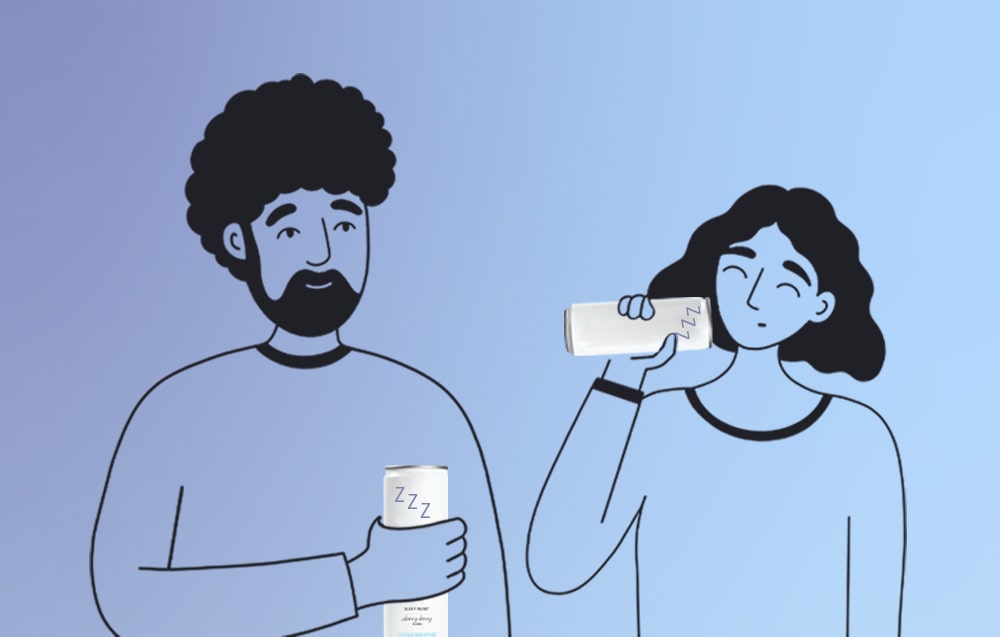
However, it’s important to note that everyone is different. “[The] impact of relaxation drinks on sleep will vary from person to person,” says Michael Murdy, food scientist, beer brewer/mixologist, chef, and founder of Robust Kitchen. “Some people may find that these drinks help them relax … while others may not experience any significant impact.” Murdy’s best advice is trying these drinks and observing how they work with and for your body.
Potential Relaxation Drink Risks and Side Effects
As with anything, too much of a good thing can have its drawbacks. Let’s cover some potential risks and side effects anti-energy drinks may have on you.
Polypharmacy
The American Academy of Family Physicians defines polypharmacy as “the regular use of at least five medications at once.” When it comes to anti-energy drinks, many of them can feature a combination of melatonin, L-theanine, valerian root, kava, or any of the other ingredients we’ve listed in this article.
Each of these ingredients, while helpful in getting you to drift off to dreamland, have their own risks and side effects. When you combine them into one drink and take them repeatedly, you’re putting yourself at greater risk for the side effects to happen.
Katherine Gomez, a registered dietitian and medical reviewer for Psyche Magazine mentions four potential risks for anti-energy drinks:
- Dehydration
- Allergic reactions
- Drowsiness
- Interaction with medications
“Some relaxation beverages contain melatonin or herbs such as valerian root or chamomile, which can interfere with drugs such as antidepressants, blood pressure meds, and others,” Gomez said. “Before using any sleep-promoting items, consult your doctor, especially if you are on any medicines.”
Unstandardized Dosage Control
While many of the ingredients in anti-energy drinks are either something our bodies naturally produce, or have histories of being used medicinally, the fact remains: They don’t have enough scientific backing to be regulated.
“You need to be cautious when purchasing and consuming any type of supplement, as they’re not regulated by the FDA,” Kelsey Kunik, a registered dietitian and nutrition advisor for Fin vs Fin, says
It is important to exercise caution, even with natural, plant-based products like kava and valerian root. These ingredients aren’t regulated or don’t have standard dosage recommendations for a reason. “[Anti-energy drinks] are often marketed as promoting relaxation and better sleep. However, the effectiveness of these drinks in promoting sleep is still the subject of scientific debate,” says Melissa Collins, a food scientist and chef for Perfect Brew.
Even melatonin, something our bodies naturally produce, isn’t regulated. And believe it or not, there is such a thing as too much melatonin. We did a deep dive on whether or not you can overdose on melatonin, so be sure to read that article for more detailed information.
Leaving Underlying Mental Health Issues Unaddressed
Poor sleep happens from a variety of factors, and sometimes it can be hard to pinpoint the source. One might be convinced to turn to anti-energy drinks as a way to help them sleep, but if the drinks aren’t working, it should be an indicator to examine lifestyle or health factors. One of those being your mental health.
Our mental health and our ability to get quality sleep are very closely linked. There are many mental health disorders that can impact your sleep, such as:
- Anxiety
- Depression
- Post-Traumatic Stress Disorder (PTSD)
- Attention Deficit Hyperactivity Disorder (ADHD)
- Seasonal Affective Disorder (SAD)
Each can impact your sleep in different ways, and a relaxation drink won’t be a magic cure-all to get you to sleep better. In fact, some of the ingredients in anti-energy drinks can interact negatively with antidepressants.
Be sure to read our mental health and sleep guide to fully understand how mental health and sleep are linked.
Best Mocktail Recipes: What to Drink Instead of Alcohol to Relax
Many people turn to a glass of wine or a cocktail to unwind after a long day. Alcohol can make one sleepy, but it’s an entirely different story when it comes to staying asleep, or getting quality sleep after a drink. Enter the relaxation mocktail.
Anthony Psyk, a bartender and coffee aficionado for Brew That Coffee shared his knowledge about creating the perfect mocktails for those wanting to turn to something other than alcohol to relax. “As a coffee aficionado, I understand the boost of energy and alertness that a good cup of coffee can provide. However, I also know that sometimes it’s important to wind down and promote better sleep,” Psyk says.
Chamomile Spritz
One of Psyk’s favorite relaxing cocktails is a drink he calls the Chamomile Spritz. Psyk shared his recipe on how to create the Chamomile Spritz at home!
Ingredients:
- 1 chamomile tea bag
- 1 cup of water
- 1/4 cup of ginger ale
- 1/4 cup of sparkling water
- 1 tablespoon of honey
- 1 tablespoon of lemon juice
- Ice
- Fresh mint for garnish
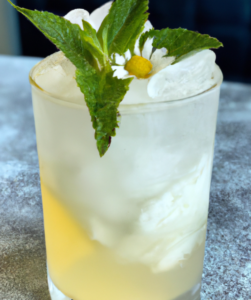
Instructions:
- Start by brewing a cup of chamomile tea. Bring one cup of water to a boil, and add a chamomile tea bag. Steep the tea for about 5 minutes, or until it reaches the desired strength.
- Once the tea has brewed, remove the tea bag and allow the tea to cool to room temperature.
- In a large glass, mix together the ginger ale, sparkling water, honey, and lemon juice.
- Add ice to the glass, filling it about halfway.
- Pour the cooled chamomile tea into the glass, filling it the rest of the way.
- Give the drink a quick stir to mix all the ingredients together.
- Garnish with a sprig of fresh mint for an extra touch.
Other Mocktails
Psyk provided a few other relaxation drinks he’s made before.
Lavender Lemonade: This is a refreshing drink that combines the calming properties of lavender with the tartness of lemon. To make it, mix lemon juice, lavender syrup, and sparkling water. Garnish with a slice of lemon and a sprig of lavender for an extra touch.
Tart Cherry Tea: Tart cherry juice is high in melatonin, a hormone that regulates sleep. Brew a cup of tart cherry tea by steeping dried tart cherries in hot water for several minutes. Sweeten with honey to taste.
Kava Colada: Kava is a plant native to the South Pacific and is often used to promote relaxation and reduce anxiety. To make a kava colada, blend kava powder with pineapple juice, coconut cream, and ice. Serve in a tiki glass and garnish with a slice of pineapple.
How to Get Better Sleep at Night and Relax without Drinking
The average amount of hours recommended to sleep is eight, but the fact of the matter is that that number is just an average. You won’t necessarily get that number every night. And of course, there are those out there who don’t want to take any sort of supplement or a drink to get better sleep. Getting better sleep goes beyond just going to bed at the “right time.”
Sometimes, the solution is as simple as changing your sleep environment. Here are some ideas to implement:
- Create a relaxing environment – remove distractions and screens from your room
- Keep it cool – the recommended temperature to get good sleep is 68 degrees
- Meditate – be it before you go to bed or right after you wake up, meditation can get you in a good mindset
- Keep it dark – invest in some blackout curtains or remove as many sources of light as possible
If you’re doing all these things, getting eight hours of sleep, and still feel tired, you might not be getting enough deep sleep. Some of the ingredients for anti-energy drinks can help improve your deep sleep. But for a full rundown, read our how to get more deep sleep article!
FAQs
Still need some more information on anti-energy drinks? We’ve compiled a list of of some frequently asked questions.
Are relaxation drinks non-alcoholic?
Yes! Alcohol can help you relax, but if the goal is to fall asleep and stay asleep, alcohol is not the answer. Relaxation drinks promote good, deep sleep, and are alcohol-free.
Are relaxation drinks like muscle relaxers?
When it comes to prescription muscle relaxers, no, relaxation drinks will not have the same effect. Some relaxation drinks include magnesium, which is something our bodies can produce naturally. Magnesium helps with muscle recovery, so if your drink includes magnesium, it can help you feel more relaxed. But relaxation drinks are not, and should not, be a replacement for prescription muscle relaxers.
If you feel like you need muscle relaxers, please consult your doctor.
How can I relax without drinking?
You can totally relax without drinking! Consider making lifestyle changes or creating a sleep environment that will promote relaxation and sleep. This can include keeping your room as dark as possible or bumping the thermostat down. You can also look into meditation either before or after bed to help you relax.
Do CBD drinks relax you?
Due to the general calming and relaxing qualities of CBD, drinks that include CBD could potentially help you feel calm and at ease. However, more research is needed in order to give a definitive answer. Read our article about if cannabis can help you sleep for more information.

